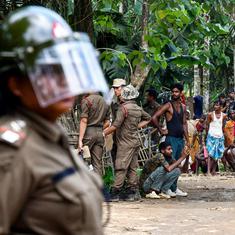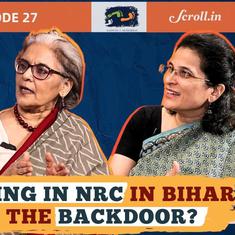After spending a year in jail, Adivasi journalist Somaru Nag, the first of several journalists to be arrested in Chhattisgarh on charges of aiding Maoists last year, walked free on July 21. Judge Niranjan Lal Chauhan of the Jagdalpur court found no “direct or indirect evidence” against Nag and the other two accused – Dashman Nag and Ramlal Kashyap.
Nag, a stringer with the Rajasthan Patrika, had been arrested on July 16 last year and later booked on charges of helping Maoists destroy a crusher plant engaged in road construction.
His arrest was followed by that of journalists Santosh Yadav, Prabhat Singh and Deepak Jaiswal all of whom reported for various regional language papers from Chhattisgarh’s restive Bastar region. The arrests had created an uproar.
Singh and Jaiswal got bail from the Bilaspur High Court three weeks prior to Nag’s release. Yadav continues to be incarcerated.
Yadav facing threats in prison
According to Yadav’s father, who met the journalist in jail on Tuesday, Yadav is being threatened. The senior Yadav said that his son had broken down repeatedly when he met him, and told him that two men inside prison had threatened him for the third time and said they would “finish him off and no one would know about it”.
“I fear greatly for his life inside prison”, said Poonam Yadav, wife of Santosh Yadav, over the phone.
No evidence
Activists feel that the July 21 verdict, which led to Nag’s release, vindicated their claims that journalists in Chhattisgarh, especially in Bastar, were being victimised by the police.
After examining 18 witnesses, the court quashed all the charges against Nag and the other accused, and ordered their immediate release. They had been charged under several sections of the Indian Penal Code, including those pertaining to rioting, dacoity, wrongful confinement, criminal intimidation and criminal conspiracy.
In an FIR against unknown persons on the basis of which Nag was arrested, the key petitioner, Jagdish Vasne, had said that on June 25, 2015, approximately 25 armed Maoist cadres entered the crusher plant, burnt the machine and looted material.
The police claimed to have retrieved one of the implements used during the attack – an iron crowbar with a green dot – from Nag’s home.
The court observed that during cross-examination Vasne accepted that he did not recognise any of the three accused of being present at the time of the attack.
Two other witnesses, Hidmoram Markam and Budhram, both working with the police as “gopniya sainik” (secret police) said that they did not accompany the police when the crowbar was seized from Nag’s home, thus casting doubts over Nag’s involvement in the crime.
Coerced confession?
The only evidence against the accused were the alleged confessions they made at the police station, which Justice Chauhan observed in his order as being inadmissible under the Indian Evidence Act.
According to RC Lehri, who is in charge of the thana at Kodenar, Nag recorded in his confessional statement that he was on his motorcycle and keeping a watch on June 25 as Maoist cadres destroyed the crusher plant. According to the statement, after the incident, a person by the name of Lachhindar rode pillion on Nag’s bike and was dropped midway. The alleged confession said that Nag then kept the iron crowbar at his residence, which Lehri recovered the next day.
The cross-examination of the witnesses indicated that the so-called confession had been extracted from Nag by force by the thana incharge.
Shaken, but keen on starting work
As a stringer, Nag contributed news reports to the Rajasthan Patrika from the remote and sensitive Darbha region of Bastar district, over the last four years.
Nag, who is badly shaken by his experience, is unable to fathom why he was even booked in this case. “I don’t think I covered anything controversial, except news on schools, anganwadi centres and roads,” said Nag, on the telephone.
His simple life in his village where he wrote for the Patrika and also ran a photocopy shop has been brought to an abrupt standstill.
His photocopy machine is out of order now due to the lack of maintenance, and he hasn’t yet met his editor.
He said that he would like to continue to report like he used to as he enjoyed what he did. “Pehle apne mansik santulan ko kayam karunga (Let me recover from the mental stress),” said Nag, laughing nervously.
Though pleased with the verdict, his lawyer Arvind Chaudhary was critical of the way Nag was dragged into the case.
“It held no ground,” said Chaudhary. “The only witnesses who would stand against Somaru were police witnesses, which the court was not willing to accept, clearly revealing that he was trapped by the police with malicious intent.”
The two other journalists, Prabhat Singh and Deepak Jaiswal, were arrested under various sections of the Indian Penal Code including those pertaining to trespassing (they allegedly entered the Kanya Ashram in Geedam to take “random footage”), extortion, obstructing public servants in discharge of public function, cheating, with additional charges under the IT Act against Singh for using abusive language in a WhatsApp group.
Both moved the Bilaspur High Court and got bail on June 26 after spending three months in the Jagdalpur prison.
“The matter is pending with the court, therefore [it is] improper to comment on the cases,” said Kshitij Dube, advocate for Singh and Jaiswal. However, he added that the cases against his clients appeared to be an afterthought, indicating malicious intent.
Ironically, Subba Rao – a member of the now disbanded Samajik Ekta Manch, a vigilante group propped up by the police, who was an accomplice in the FIR against Prabhat Singh – was recently convicted by the Jagdalpur court under Section 411 of the Indian Penal Code for dishonestly receiving stolen jewellery.
Rao is believed to be close to SRP Kalluri, Bastar’s Inspector General of Police. Among other things, Singh has been charged with making obscene remarks against Kalluri.
‘Chhattisgarh government to blame’
Lakhan Singh, president of the People’s Union for Civil Liberties, Chhattisgarh, said that it was no coincidence that all the journalists who were harassed and jailed on false charges in Chhattisgarh were from Bastar.
He said that journalists like Nag, Singh and Yadav filed reports of state excesses, especially in Bastar, which was causing embarrassment to the Raman Singh government.
Lakhan Singh recently presided over an award ceremony given to 14 journalists from Chhattisgarh including Prabhat Singh and Deepak Jaiswal for their “fearless reporting”.
Meanwhile, a high-powered committee set up by Chief Minister Raman Singh in early February to specifically address cases filed against journalists in the state hangs fire.
The six member committee – which comprises four government members and two journalists – has met once, said Ruchir Garg, editor, Navbharat Times, who is on the committee.
The first meeting was held in late April and the second meeting is anticipated in the coming months. Asked whether the cases of journalists against whom cases have been made were being considered by the committee, not wanting to sound sceptical, Garg said that it was premature to expect the first meeting to take up these cases but was hopeful that subsequent meetings would be fruitful.











